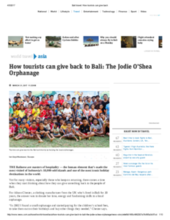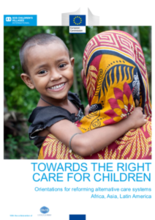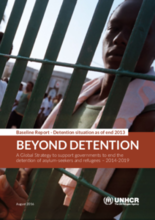demographic_data
childrens_living_arrangement
children_living_without_bio
adoption
social_work_force
key_stakeholders
Key Stakeholders
Add New DataOther Relevant Reforms
Add New Datadrivers_of_institutionalisation
Drivers of Institutionaliziation
Add New Datakey_research_and_information
Key Data Sources
Add New DataDisplaying 61 - 70 of 109
This story from the BBC features Indonesia's left behind children.
How some orphanages in Bali use children to get money from the government and donations from tourists.
The general objective of this study was to conduct a research on the possible issue of institutionalisation in six South and Central American, Asian and African countries in order to strengthen the knowledge of the European Commission on the nature, the extent and scope of institutionalisation and feasibility of de-institutionalisation (alternative care for children).
Global Strategy – Beyond Detention 2014-2019 is a document released by UNHCR, which aims to support governments to end the detention of asylum-seekers and refugees.
A video campaign on family based care that is being displayed in a major chain of cinemas in Indonesia. The video contains a message on the importance of family based care for children by representatives of all religious leaders and the Ministry of Social Affairs.
This video highlights the importance of keeping children with families.
This post is part of the Better Volunteering Better Care Initiative’s month-long spread of articles aimed at raising awareness around the issues of orphanage volunteering. In this post, the author explains that, around the world, many orphanages are being run, not by government, but by church groups and individuals who start as volunteers. “The institutions are poorly regulated and they’re doing a job that could be done by the children’s families, with the right support,” says Smith.
The Childline Foundation, along with three universities, will be conducting a mapping exercise of all child care institutions in Kerala, India, according to this article from NYOOOZ.
People with psychosocial disabilities (mental health conditions) in Indonesia are shackled or forced into institutions where they often face physical and sexual violence, and involuntary treatment including electroshock therapy, seclusion, restraint and forced contraception. Human Rights Watch examines how people with psychosocial disabilities often end up chained or locked up in overcrowded and unsanitary institutions, without their consent, due to stigma and the absence of adequate community-based support services, including mental health care.
This animated video describes Indonesia's Families First Signature Program which began in 2005. The goal of Families First is to ensure that every child in Indonesia has a safe, family environment, recognizing that family-based care is best for child development. The video describes how the Signature Program has helped shift care away from institutions towards family-based care.



